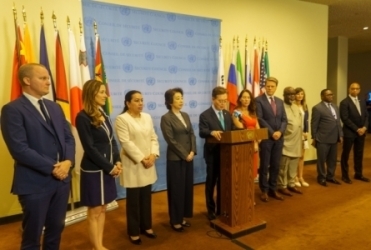Joint Press Stakeout by the Security Council pledgers of the Joint Pledges related to Climate, Peace and Security on the Security Council briefing on Afghanistan
2024/6/21

We, the Security Council members that have joined the Joint Pledges on Climate, Peace and Security; France, Guyana, Japan, Malta, Mozambique, Sierra Leone, Slovenia, Switzerland, the United Kingdom, the United States, and my own country, the Republic of Korea, have come together to highlight the adverse impacts of climate change on peace and security in Afghanistan.
Afghanistan, a landlocked and mountainous country featuring glaciers and deserts, suffers from scarce water resources and extreme weather events, all projected to exacerbate with climate change. Decades of conflict, coupled with the Taliban’s edicts targeting Afghan women and girls, have left the country with limited capacity for adaptation and disaster preparedness.
The interlinkages between climate change, peace and security are evident in Afghanistan.
Human suffering and displacement are on the rise following climate-related natural disasters. Only last month, hundreds of people lost their lives and were displaced due to flash floods.
Prolonged and more frequent drought and floods jeopardize agricultural livelihoods and production, further exacerbating food insecurity and humanitarian crisis. Farmers are pressured into negative coping mechanisms, including drought-resistant cash crops such as poppies.
Tensions over land and water can trigger local conflicts in the absence of proper resource management. The possibility of disputes between riparian states over freshwater resources raises serious concerns in the region, and calls for stronger transboundary water cooperation.
The populations exposed to climate-related risks may be vulnerable to terrorist propaganda and recruitment.
Above all, the systemic human rights abuses Afghan women and girls face, including of their freedom of movement, peaceful assembly and expression, as well as of access to work and education, limit their access to humanitarian aid and significantly undermine the entire Afghan population’s capacity to cope with the impacts of climate change. We reaffirm their indispensable role in conflict prevention and peacebuilding, and the importance of their full, equal, meaningful, and safe participation in public life.
We are committed to integrating the climate, peace and security nexus in our deliberations regarding Afghanistan on the Security Council. We welcome the upcoming deployment of a climate, peace and security advisor to UNAMA in this regard. We also invite the Secretary General to integrate the nexus in upcoming meetings of the Special Envoys on Afghanistan. The international community should scale up holistic efforts to ensure that addressing climate change in Afghanistan contributes to our common goal of peace, stability, and inclusive development in the country.
